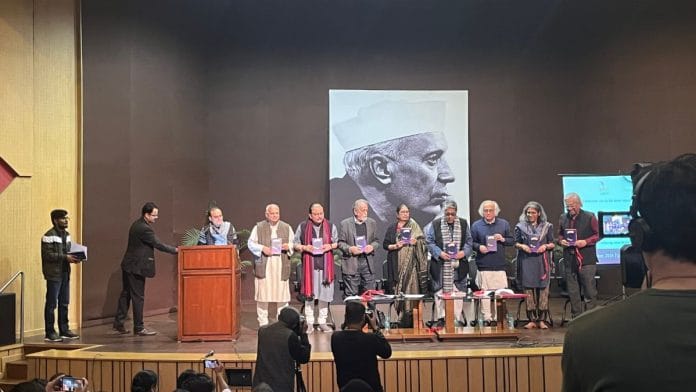New Delhi: Many people want to tear down Jawaharlal Nehru’s legacy, but he is a “wall that never breaks,” said Rajya Sabha MP Manoj Jha at the launch of Aditya Mukherjee’s new book, Nehru’s India: Past, Present and Future.
As India’s first prime minister and one of the architects of the Non-Aligned Movement, Nehru was a defining figure in a post-colonial world. The new book by Mukherjee, a retired JNU professor and general president of the Indian History Congress (2023-24), captures this enduring legacy.
“We all have seen that cement advertisement where they say, ‘Why doesn’t this wall break?’ Nehru is that wall for us and for India. It never breaks despite endless efforts,” said Jha.
Over a hundred people—from students to professors—gathered at Jawhar Bhawan on 4 December for the launch. The book explores Nehru’s vision for India and offers readers a peek into his democratic ideals, beliefs in secularism, and efforts toward modernisation.
“The idea of India is not just about pluralism and tolerance; it is about democracy, secularism, and a modern, scientific outlook,” said Mukherjee, who was in conversation with Jha, Congress MP Jairam Ramesh, The Wire editor Seema Chishti, former UPSC member Purshottam Agarwal, anti-child labour activist and Padma Shri Shantha Sinha, and JNU professor Prabhat Patnaik.

Jokes and insights about Nehru
The event was not without its lighter moments. Jha joked that he learned more about Nehru after 2014, when people started creating a fake narrative and blaming everything on him.
“Before that I only knew about Nehru as much as any other graduate student,” said Jha. But the more he read about the first prime minister—letters, speeches, books—the deeper his fascination grew. After this, Manoj Jha was inspired to write letters to his daughters on their birthdays.
“I learnt this art of writing letters from Nehru. Nehru used to write letters to his daughter [Indira Gandhi] and I wrote to my daughters as well,” said Jha. On 14 November, Nehru’s birth anniversary, Jha wrote a letter to Prime Minister Narendra Modi—as Nehru.
“I don’t know if the PM has read it but he would have been thinking that Nehru is not leaving him even after dying,” said Jha and the entire hall filled with laughter.
Chishti shared an interesting and significant exchange between Nehru and poet-writer Faiz Ahmed Faiz, which took place during a Progressive Writers Association meeting in 1940.
“‘Has none of you done a proper translation of The Internationale?’” Nehru asked. When Faiz replied that he hadn’t, Nehru firmly told him, “Well, that’s the first thing you progressive writers should do,’” recounted Chishti, referring to *The Internationale*—a song by Pierre De Geyter widely adopted by communists as an anthem.
Decades later, in 1960, when Nehru met Faiz again at a coffee house, he quipped, “Whenever I meet you, you’re either inside the prison, just come out, or just going in. Why don’t you just settle down and stay inside the prison?” This remark, Chishti added, reflected Nehru’s wry humour and affectionate take on Faiz’s tumultuous political life.
Also read: Nehru’s idealism vs prejudiced Bharat. ‘Trust India’, says Javed Akhtar at book launch
Nehru’s audacity and vision
Nehru’s ideal of composite nationalism was not just about unity but also about fostering a shared identity among diverse communities.
“To stand firm on the principles of a secular, democratic state required immense conviction. Nehru’s clarity of vision and unwavering commitment to these principles made him a monumental figure, shaping India’s foundational identity,” said Jha.
But the unspoken consensus was that this ideal is under threat as the author Mukherjee noted that the word democracy has “disappeared from the description of India”.
“This stark reality underscores the need to defend and uphold Nehru’s vision, as it continues to guide India in its quest for justice, equality, and fraternity,” said Mukherjee
The book launch lasted nearly two hours, but nobody seemed bored. Instead, it felt like a meeting of similar minds.
“The event was a reminder that despite the efforts to demonise and erase his memory, the idea of India that Nehru championed continues to inspire and shape the nation’s future,” said Sandeep Maurya, a JNU fellow who attended this event.
(Edited by Prashant)






